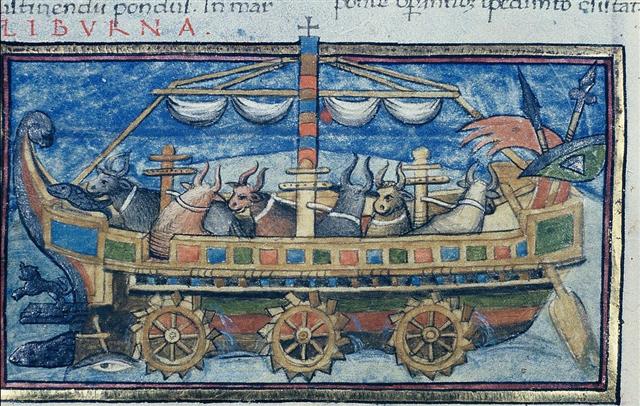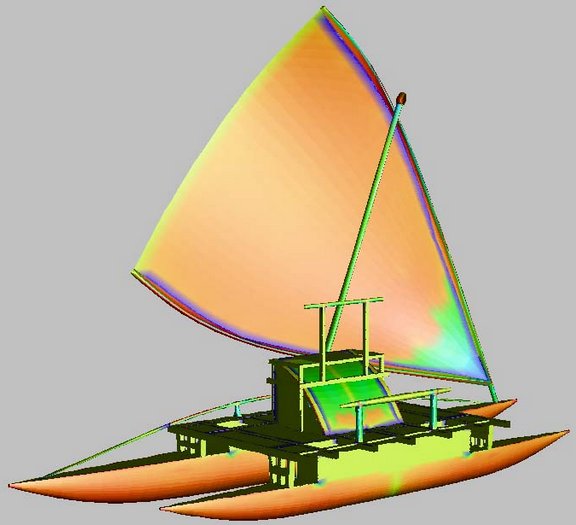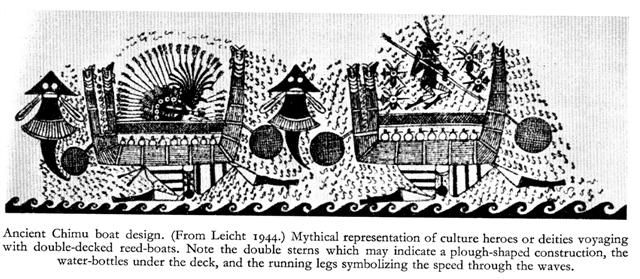Bb2.6 After Old Spider had warmed the 'first snail' (the Moon), she repeated the process with the bigger one (the Sun). 3 nights' sleep + 3 nights' sleep = 6 moega nights. Surely we will recall how in Manuscript E it was stated that the ship (te miro) of Hotu A Matua could not leave the ancient homeland before it had been fully loaded, which took 6 days. Miro. 1. Wood, stick; also (probably improperly) used for 'tree': miro tahiti, a tree from Tahiti (Melia azedarach); miro huru iti, shrub. 2. Wooden vessel (canoe, boat); today pah˙ (a Tahitian word) is more used, especially when speaking of modern boats. 3. Name of the tribe, of royal blood, descended from Ariki Hotu Matu'a. Vanaga. Miro-oone, model boat made of earth in which the 'boat festivals' used to be celebrated. Vanaga. ... on the first day of the year the natives dress in navy uniforms and performs exercises which imitate the maneuvers of ships' crews ... MÚtraux. Tree, plant, wood, plank, ship, building; miro hokuhoku, bush, thicket; miro takataka, bush; miro tupu, tree; miro vavau, switch. Miroahi, firebrand. Mimiro, compass, to roll one over another, to turn in a circle. P Pau.: miro, to rope. Churchill. 1. Wood. 2. Ship (Ko te rua o te raa i tu'i ai te miro ki Rikitea tupuaki ki Magareva = On the second day the boat arrived at Rikitea which is close to Mangareva. He patu mai i te puaka mo ma'u ki ruga ki te miro = They corralled the cattle in order to carry them on to the boat.) Krupa. T. 1. The tree Thespesia populnea. ... a fine tree with bright-green heart-shaped leaves and a yellow flower resembling that of the fau, but not opening wide. The fruit is hemispherical and about twice the size of a walnut, consisting of brittle shell in which are several septa, each containing a single seed. The wood resembles rosewood and is of much the same texture. Formerly, this tree was held sacred. Henry. 2. Rock. (To'a-te-miro = Long-standing-rock.) Henry.
... Hotu called out to Teke: 'Go and bring the 500 prisoners on board the canoe!' He took all of them along, led them on board the canoe, and left them there. For six days (po ono), mats (moenga) were taken on board the canoe (i.e., the loading of the canoe took six days) ... [E:73-74] Old Spider then achieved a little light (and some room for sitting down) by prompting the first snail (the Moon) to open the bivalve shell a little.
But it was not the Sun (the 2nd 'snail') who raised the top higher, it was another creature, viz. the big 'worm':
... J÷rmungandr, alternately referred to as the Midgard Serpent or World Serpent, is a sea serpent of the Norse mythology, the middle child of the giantess Angrboa and the god Loki. According to the Prose Edda, Odin took Loki's three children, Fenris˙lfr, Hel and J÷rmungandr. He tossed J÷rmungandr into the great ocean that encircles Midgard. The serpent grew so big that he was able to surround the Earth and grasp his own tail, and as a result he earned the alternate name of the Midgard Serpent or World Serpent ...
The fate of the Moon (the first snail) was then, it had been decided, to be in the west.
In a 2nd great effort the big worm then also established the Raised-up-Sky by lifting the top shell so high that it became the sky dome. ... This Snake-river of sparkling dust, the stream of the abyss on high through which it runs, the golden cord of the heaven-god ... connected alike with the hill of the Sun-god and with the passage of ghosts, is the Milky Way ... The Norsmen knew it as the Path of the Ghosts going to Valh÷ll (Valhalla), in the region Gladsheimr, - the palace of their heroes slain in battle; and our North American Indians had the same idea, as witness the 'wrinkled old Nokomis', when, teaching the little Hiawatha, she Showed the broad white road in heaven, / Pathway of the ghosts, the shadows, / Running straight across the heavens, / Crowded with the ghosts, the shadows, / To the Kingdom of Ponemah, / To the land of the hereafter; the brighter stars along the Road marking their camp-fires ... Our aborigines and the Eskimo also called it the Ashen Path, as did the Bushmen of Africa, - the ashes hot and glowing, instead of cold and dark ... His salty sweat had collected down in the lower half-shell to form the Sea, and finally the Sun was placed beside the lower half-shell (i.e. the Earth).
When the double-canoe of Hotu A Matua was ready to sail the day had become te porua o te raa. o hora nui - the 2nd day of September.
Hora. Ancient name of summer (toga-hora, winter summer). Vanaga. 1. In haste (horahorau). 2. Summer, April; hora nui, March; vaha hora, spring. 3. 'Hour', 'watch'. 4. Pau.: hora, salted, briny. Ta.: horahora, bitter. Mq.: hoßhoß, id. 5. Ta.: hora, Tephrosia piscatoria, to poison fish therewith. Ha.: hola, to poison fish. Churchill. Horahora, to spread, unfold, extend, to heave to; hohora, to come into leaf. P Pau.: hohora, to unfold, to unroll; horahora, to spread out, to unwrap. Mgv.: hohora, to spread out clothes as a carpet; mahora, to stretch out (from the smallest extension to the greatest), Mq.: hohoß, to display, to spread out, to unroll. Ta.: hohora, to open, to display; hora, to extend the hand in giving it. Churchill. Hotu. Ta.: hotu, to produce fruit, Sa.: fotu, id. Mgv.: akahotu, the September season. Churchill. H.: Hoku, Night of the full moon. When this moon set before daylight it was called Hoku Palemo, Hoku that slips away. When it set after daylight it was called Hoku Ili, grounded Hoku. Ka mahina o Hoku, the full moon of the night Hoku. Cf. hōkū, star. Hō kū, star. (PPN fetu'u). Wehewehe. ... When this tremendous task had been accomplished Atea took a third husband, Fa'a-hotu, Make Fruitful. Then occurred a curious event. Whether Atea had wearied of bringing forth offspring we are not told, but certain it is that Atea and her husband Fa'a-hotu exchanged sexes. Then the [male] eyes of Atea glanced down at those of his wife Hotu and they begat Ru. It was this Ru who explored the whole earth and divided it into north, south, east, and west ... This date corresponds to the night when the Full Moon (Hotu) was at Fomalhaut. Could the 'flippers' flanking the uplifted King (World Tree) have illustrated the 'limbs' bound to propel the Sun ahead? I.e. the pair of canoe hulls lashed together. ... The explorers reach Easter Island in a 'canoe' (vaka). The name of their craft is given as Oraorangaru 'saved from the billows' (Brown 1924:40) or Te Oraora-miro 'the living-wood' (ME:58). The Routledge reference 'Each (man went) on a piece of wood' (RM:278) also seems to refer to the name of the canoe. As far back as 1934, the name was no longer understood. I favor the following explanation: The difficulty in interpreting the name of the canoe of the explorers arises from the name segment oraora. To begin with, the compound form oraora ngaru should be analyzed in comparison with other Polynesian compounds, such as MAO. pare-ngaru 'that which fends off the waves' (i.e., the hull of the boat), TAH. tere-'aru 'that which moves through the waves' (i.e., riding the waves on a board). There are several possible translations for oraora as the reduplication of ora. Te Oraora Miro can be translated as 'the pieces of wood, tightly lashed together' (compare TAH. oraora 'to set close together, to fit parts of a canoe') and be taken to refer to the method of construction of the explorer canoe, while Oraora Ngaru means 'that which parts the water like a wedge', or 'that which saves (one) from the waves, that which is stronger than the waves'. (Barthel 2) We should here notice a possible clue to the word Parei of Metoro. Garu. Surfing. Garuru, to feel dizzy, seasick; to have a sudden headache: he garuru te puoko. Vanaga. 1. To swim over the waves (see aruaru 2). P Mgv.: garu, foam, froth. Mq.: ka˙, na˙tai, wave, billow. Pau.: puhi-garu, a bubble of water. In aruaru 2 is found another galu derivative. The sense of this garu is nowhere else encountered; the stem means simply the waves and involves no idea of swimming. We note, however, the Viti galo to swim; un uncertain identification. 2. Garu hoa, a friend of either sex. PS Sa.: galu, an number of young persons (galu teine, galu taulele'a). To.: ? gauta, many in number. Data fail for the comparison. The plural sense of the Samoan does not appear in Rapanui. The Tongan form involves the rather infrequent loss of an inner l and leaves the latter element ta unexplained. Garuru, headache, vertigo; puoko garuru, migraine. P Mgv.: garuru, nausea that persists. Mq.: na˙˙, ka˙˙, headache, migraine. Churchill.
*347 (Fomalhaut) - *74 (Almaaz) = *273 → Winnowing Basket (Φ Sagittarii). 273 (= 3 * 91) + 183 (= 366 / 2) = 456 (Bb2-4) = 19 * 24.
|
||||||||||||||||||||||||||||||||||||||||||||||||||||||||||||||||||||||||||||||||||||||||||||||||||||||||||||||||||





.jpg)



